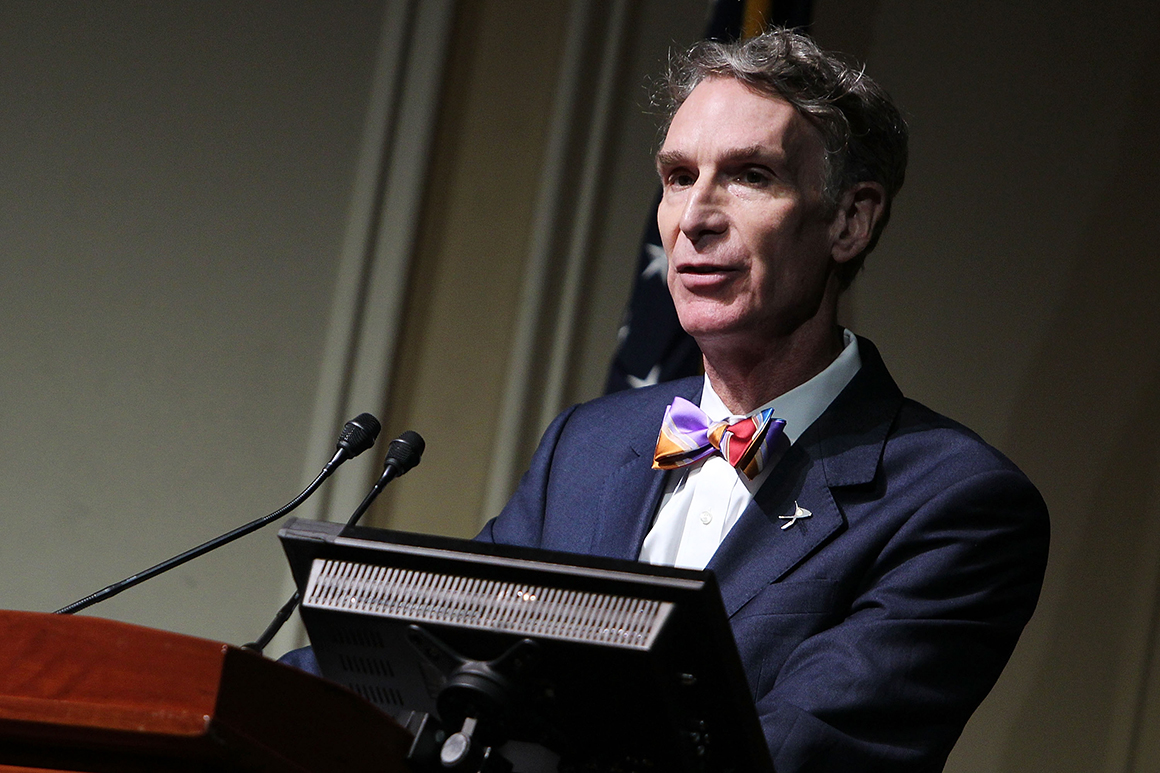
One of Nye’s top priorities is maintaining support for a mission to bring a sample of Martian rock back to Earth for geologists to study for signs of life.
The mission will begin this summer with the launch of the Mars 2020 rover, which will collect samples to be returned to Earth. The biggest challenge, according to Nye, may be overcoming Martian gravity to get samples off the surface of the Red Planet, a feat that has never been done.
Ultimately, Nye, who worked at Boeing before launching his hit TV show, said exploring space must remain a top policy priority even with all the financial and other demands here on Earth.
“We have all kinds of problems here on Earth, oh my goodness,“ he says. But space brings out the best in us. Space is optimistic. If you stop looking up and out, what does that say about you? Whatever it is, it’s not good.”
Nye also spoke about why NASA must push forward with the troubled James Webb Space Telescope, a successor to the Hubble Space Telescope, and how astrophysicist Carl Sagan sparked his own interest in space at Cornell University.
This transcript has been edited for length and clarity.
What is your top message to Congress?
There’s three things we talk about all the time: exploring planets, not getting hit with an asteroid, also called planetary defense, and then the search for life on other worlds. I want to find life on another world in my lifetime.
The planetary science budget is up right now at $2.66 billion, which is good. Some of my best friends are geologists. … They want to look at Mars rocks, so let’s get that done. Right now, in the planetary science budget, that will get done. It’s four missions. … Mars 2020 will put samples on the martian surface in little containers. They’re the size of golf pencils, the rock samples.
Geologists want to look at the molecules, the minerals, the crystalline structure. The next mission will pick them up. That’s a European rover that goes by the name Fetch. … After Fetch, the hard thing is … the Mars Ascent Vehicle. We’ve launched stuff off of the moon, we’ve launched stuff off of asteroids. In fact it’s hard to keep things on asteroids there’s so little gravity. But getting off Mars, you’re going to need a lot of fuel to get into orbit. Then a NASA mission, the fourth mission in this sequence, will bring the samples back.
What are lawmakers’ reactions to this?
The first thing every congressman said is … Are they worried about contaminating the Earth with Martian dust? My answer is yes! If you thought of it, they thought of it. Those rocket scientists thought of it. When you look at other stuff coming back from asteroids, there was no contamination and no deadly organisms. The surface of Mars is quite sterile. Furthermore, you can plan for that. It’s not the end of the world. There are spacecraft orbiting Mars right now that are not getting any younger, so we want to get these missions flying as soon as possible.
The reason I took this job is space exploration is the only thing people agree on. People on both sides agree it’s a worthy use of our intellect and treasure. So everybody is very supportive of it when we talk to them. … There’s nobody in Congress who doesn’t support space exploration. NASA is the best brand the U.S. has. Go around the world, everybody respects what NASA does. As Lyndon Johnson said, you can’t be a world leader without being a leader in space. This was in the Apollo era, but it’s still true.
Why does James Webb have continued support despite being over budget and behind schedule?
If you’re in for the dime, you’re in for the dollar. … They had too many miracles. They had to do too many things that had never been done before. There were some clear managerial screw ups, like using the wrong solvent [which damaged the system] … but most of this is really, really difficult. You’re trying to make something passively cold enough to detect a planet that is in front of another sun dozens or even hundreds of lightyears away. It’s not trivial.
No one else can do it. NASA is the only organization that can do it. Everyone says what about SpaceX? What about Blue Origin? They’re great and they’re going to get a lot of business from NASA and communications companies, but there’s not a business case for detecting planets passing in front of other stars, unless you’re selling that information to the astronomical community, and some of those astronomers drive Honda Accords and Chevy Impalas! They’re loaded! I’m kidding.
No one else can explore Mars or drive around on Mars. There’s all this talk about landing there with people, but it’s all because somebody mapped it using tax dollars. Someone explored it with tax dollars. That’s the way it should be. NASA does what no one else can do, that’s why we fund it. People make a very strong argument that you wouldn’t have the internet without the space program. You certainly wouldn’t have a weather forecast.
How did you get interested in space?
I had a very good physics teacher in high school and he encouraged me to take the physics advanced placement exam when it was this new thing in the 1970s. … So I did ok and I got into Cornell. … I finished my engineering requirements and I took a freshman astronomy course with Carl Sagan as a senior for kicks. … Carl Sagan was all that. He was this extraordinary lecturer and he would bring slides – film slides – of stuff that no one had ever seen with pictures of Mars taken months before. He would be on the Tonight Show talking about solar sails.
He started the Planetary Society along with Louis Friedman [the former leader of the advanced planetary studies program at NASA’s Jet Propulsion Laboratory] and Bruce Murray [a former director of the Jet Propulsion Laboratory.] … They felt that public interest in space was very high, but government support was not so high.
I joined in 1980. … So I’m a charter member, I’m a believer. This is my thing. I worked at Boeing. I went to a shipyard for a while, [but] it was too low-tech, then I went to Sundstrand Data Control, [now Honeywell] which is another aerospace company.
It’s my passion. I’ve thought deeply about the idea. Mars is smaller than the Earth. It cooled off faster than the earth. It had an ocean and an atmosphere about a billion years before the Earth. So it’s reasonable that life started on Mars first.
If life started on Mars first, it’s extraordinary but not crazy to suggest that you and I are descendents of Martians. That is an extraordinary hypothesis. We can explore it and study it for $3 billion over 10 years. It’s not that much money to change the course of human history. I find this very compelling. That’s why I took this job.
We have all kinds of problems here on Earth, oh my goodness. But space brings out the best in us. Space is optimistic. It’s where we address the two deep questions: where did we all come from and are we alone in the cosmos? Is there somebody else on another world wondering about this one? You’ve got to explore space. If you stop looking up and out, what does that say about you? Whatever it is, it’s not good.
Source: politico.com
See more here: news365.stream





